|
|
|
Sort Order |
|
|
|
Items / Page
|
|
|
|
|
|
|
| Srl | Item |
| 1 |
ID:
113049
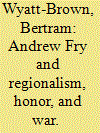

|
|
|
| 2 |
ID:
141975
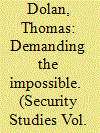

|
|
|
|
|
| Summary/Abstract |
This article shows that honor concerns can influence war initiation and termination decisions. When bargaining implicates status or commitments to in-group members, moral nationalists may experience dishonor—and with it emotions like shame and humiliation—when they have to make concessions. These honor costs are different from other costs because they can sometimes be vindicated through costly action. Including these costs in a basic, complete information bargaining model demonstrates that honor concerns can give rise to a “fight, then agree” equilibrium. These influences of honor on war initiation and termination are illustrated with case studies of British decisions in the 1982 Falklands War and French decisions during the 1940 invasion of France.
|
|
|
|
|
|
|
|
|
|
|
|
|
|
|
|
| 3 |
ID:
155273
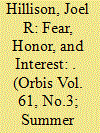

|
|
|
|
|
| Summary/Abstract |
The “America First” approach to foreign policy represents an opportunity to reassess relations with Russia. Efforts to deter Russian aggression have failed. Perhaps a new approach is needed. This article uses the lessons of the Peloponnesian War to help guide the West’s approach to Russia. By examining the three motivations for warfare—fear, honor and interest—it is possible to craft a more effective deterrent strategy while avoiding a security dilemma. Current approaches have discounted legitimate Russian fears of NATO and EU encroachment. They also have neglected the role of honor in Russia’s actions and how this impulse frames Moscow’s views of the West. Finally, NATO and the EU have lost sight of Russia’s vital interests in pursuing further eastward expansion. Where the West cannot compromise is on the security of NATO and EU members and the unity of the Trans-Atlantic alliance.
|
|
|
|
|
|
|
|
|
|
|
|
|
|
|
|
| 4 |
ID:
156656
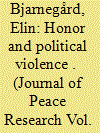

|
|
|
|
|
| Summary/Abstract |
Who participates in political violence? In this study, we investigate the issue at the micro-level, comparing individuals who have used violence in political uprisings with those who have not. We develop our argument from the observation that men are strongly overrepresented in political violence, although most men do not participate. Literature on masculinities emphasizes the role of honor and its links to different forms of violence, such as domestic abuse, criminal violence, and violent attitudes. Building on this literature, we discern two separate but related aspects of honor: honor as male societal privilege and control over female sexuality, that is, patriarchal values, and honor as ideals of masculine toughness, that is, the perceived necessity for men to be fierce and respond to affronts with violence or threats of violence in order to preserve status. We argue that patriarchal values combined with ideals of masculine toughness together constitute honor ideology, which contributes in turn to the explanation of who participates in political violence. We present new and unique individual-level survey data on these issues, collected in Thailand. We find that honor ideology strongly and robustly predicts a higher likelihood of participating in political violence among male political activists. A number of previous studies found a macro-level relationship between gender equality and peacefulness in a society. This study provides evidence for one micro-level mechanism linking gender equality and political violence at the macro level. Based on these results, we conclude that honor ideology endorsement is a driver of violence in political conflicts.
|
|
|
|
|
|
|
|
|
|
|
|
|
|
|
|
| 5 |
ID:
190718
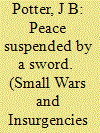

|
|
|
|
|
| Summary/Abstract |
Breaker Morant dramatizes the historical trial of a trio of Australian lieutenants who were court-martialed for executing unarmed prisoners during the Second Boer War. The midpoint turned culmination of New Australian Cinema, this film serves as an instructive case study in how soldiers justify harsh acts of violence to themselves and others. The primary mouthpieces for such explanations are the title character and the defense attorney, Major Thomas. This article argues that these justifications are rooted in factors that both men cite repeatedly – the conduct of the enemy, the chain of command, and the nature of the conflict itself.
|
|
|
|
|
|
|
|
|
|
|
|
|
|
|
|
| 6 |
ID:
173840
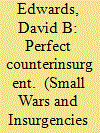

|
|
|
|
|
| Summary/Abstract |
In 2009, Major Jim Gant published a treatise online entitled One Tribe at a Time, outlining a strategy for victory in Afghanistan based on the still untested counterinsurgency doctrine developed by General David Petraeus. Gant was given the opportunity to put theory to the test by returning to the village of Mangwal in eastern Kunar Province. Evaluation of Gant’s mission has been overshadowed by the scandal that led to his resignation from the US Special Forces. This essay provides a re-examination of Gant’s time in Mangwal based on interviews with residents of Mangwal and an appraisal of the lessons that can be learned from Gant’s attempt to put counterinsurgency principles into practice.
|
|
|
|
|
|
|
|
|
|
|
|
|
|
|
|
| 7 |
ID:
082824
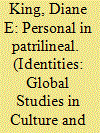

|
|
|
|
|
| Publication |
2008.
|
| Summary/Abstract |
In this article I propose a new model of namus, the concept recognized in some circum-Mediterranean, Middle Eastern, and Central and South Asian cultures and usually translated as "honor." One way to understand namus is to regard it as patrilineal sovereignty, particularly reproductive sovereignty. After an "honor killing," a "defense of honor" explanatory narrative is told by both perpetrator and community alike. I argue that an honor killing represents a show of reproductive sovereignty by people who belong to a patrilineage. I first describe ethnographic contexts in which "honor killings" are operative, and then, relying on Delaney's (1991) model of namus as deeply bound up with patrogenerative theories of procreation, argue that a hymen is both a symbolic and real border to membership in the group. Finally, I apply this new conceptualization to statecraft, specifically to killings carried out in Iraqi Kurdistan following the founding of the Kurdish statelet there in 1991. Here, reproductive sovereignty and defense of borders were operative writ large as "honor killing" logic was expanded from lineage to state.
|
|
|
|
|
|
|
|
|
|
|
|
|
|
|
|
| 8 |
ID:
151538
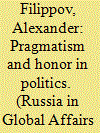

|
|
|
|
|
| Summary/Abstract |
The fall of 2016 marked the hundredth anniversary of an importantyethalf-forgotten documentin the history of political thought. On October 27, 1916 Max Weber delivered a report entitled Deutschland unter den europaischen Weltmachten ("Germany Among the European World Powers"). Shortly afterward it appeared in print in a special issue of Die Hilfe magazine, an influential periodical that politician of great authority Friedrich Naumann published for decades. After Weber's death, his article was repeatedly included in volumes of his selected political works and in the full collection of his works. Yet in contrast to his many other writings, it would never receive world acclaim. Even recently it was ignored by the editors of a Cambridge collection of Weber's political writings.
|
|
|
|
|
|
|
|
|
|
|
|
|
|
|
|
|
|
|
|
|